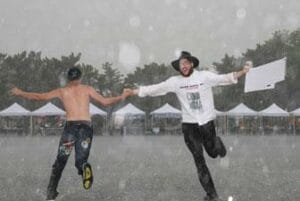By Basha Oka
Click here to see pictures of the event
The harsh fluorescent light and green-walled corridor are a strange environment for a simcha. Yet on Thursday, February 25, religious Jews, some with just yarmulkes, some with beards and black hats, crowd the hall with wineglasses in their hand.
A nurse walks by grumbling about so many visitors on Interfaith Medical Center’s third floor. Even inside the operating room there are visitors. A TV cameraman emerges from the operating room, and then a reporter, both garbed in sanitary blue paper outfits with matching shower caps.
A Chassidic Jew follows them, stopping to tell a friend, “the reporter on camera called it ‘a painful privilege!”‘
The painful privilege is the mitzvah of circumcision. The celebration is in honor of the 10,000 bris performed by Friends of Refugees of Eastern Europe on Russian Jews.
The organization, known as F.R.E.E., started performing circumcisions on Soviet refugees 20 years ago. Grown men and children, recently arrived from Russia, undergo the surgery they should have had as eight-day-old babies, but I couldn’t because of law.
Now, instead of friends and relatives gathered around in a shul or in a home, nurses and surgeons stand by as the mohel, Avrohom (Romi) Cohn, positions them on an operating table.
The 10,000th bris is a six year old boy, who will undergo general anesthesia so he won’t be frightened or have bad memories.
Numbers 10,001 and 10,0102 have already lived much of their lives. One, 42 years old, with a sensitive face and graying hair, says, “I’ve been dreaming of this for years.”
A reporter asks F.R.E.E. Board Member Rabbi Zalman Shagalov, “Why are the media here?” He replies, “There are tens of thousands of Russians in New York City who need a bris. Maybe they will read what you write and make up their mind.” Another reporter asks Rabbi Hershel Okunov, Director of F.R.E.E., how he knows it’s, the 10,000th and why he keeps count.
The answer is simple. The rabbis at F.R.E.E. need to give each patient an I.D. number, and they do it by keeping track of which bris it is. Perhaps there ?are spiritual reasons as well. Rabbis at F.R.E.E. show their love for each Jew completing this mitzvah by counting them. The patients wear their numbers on signs over their hospital gowns. To one bystander, it’s disturbing. To him the number recall concentration camps. On the contrary, someone tells him ‘ these numbers do not reflect torture on degradation. They signal that another Jew is alive at the deepest soul level, and is ready to give his mind and body over to Hashem’s will.
After the operation, the guests and reporters descend to Brooklyn Interfaith’s auditorium for a celebration including the seudas mitzvah, hosted by F.R.E.E. supporter Eliezer Goldfarb in honor of his parents’ 36th wedding anniversary. His father, Shraga Faivel, was the sandek for the 10,000th.
One long table is occupied by Mrs. Benjamin Pagovich and family. Her late husband, who passed away just two years ago at the age of 62, is about to be honored for his pioneering work for bris mila in hospitals. It was Dr. Pagovich who convinced the administration to allow a mohel to perform the bris, and who developed the ground rules for medical supervision. (The hospital was then called Brooklyn Jewish.)
The history of F.R.E.E.s devotion to helping Russians with bris mila has more than one hero. Romi Cohn, the mohel, is another. Modest, self-effacing, this prosperous businessman also sacrifices time and money to be the mohel for F.R.E.E. Mr. Cohn has been known to walk out of a closing just to accommodate a Russian who was about to change his mind.
After toastmaster Shmuel M. Butman presents the awards to Dr. Pagovich’s widow, to Romi Cohn, and to Dr. Errol Charles Mallett, Interfaith’s Chief of Urology, the band strikes up. The rabbis the join hands with the guests. Slowly, carefully they circle around, their faces beaming. Suddenly, one of the men who has just had surgery, 52-year-old Mr. Katselson from the. Ukraine, breaks into the circle and joins the dance. Rabbi Okunov smiles broadly but reminds him, “You just had surgery!” “I don’t care,” Katselson says with emotion. “This is the best day of my life!”



